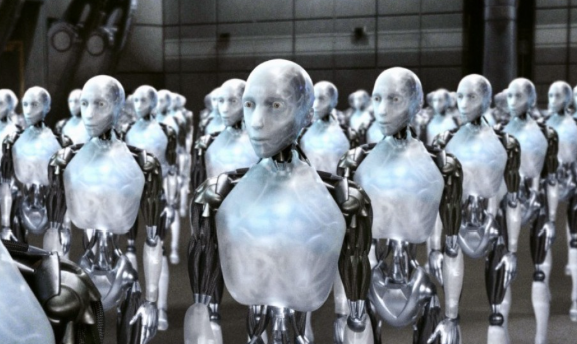
Sci-fi movies, thrillers, and tech dramas lampshade the dangers of dating in the age of technology by exaggerating, highlighting, or directly addressing those risks within their narratives. Sci-fi makes the potential pitfalls of futuristic matchmaking apps, AI partners, or virtual romances highly visible rather than subtle. A character might openly question whether their AI companion is truly capable of love, or whether an algorithm choosing their soulmate robs them of free will.
The stories throw a spotlight on potential issues with an entertaining, but also cautionary effect: viewers are invited to laugh at or reflect on how reliance on technology in dating could lead to alienation, manipulation, or loss of authentic connection.
A companion robot reaching full intelligence: A spin on “I, Robot”
“I, Robot” was a collection of sci-fi short stories by Isaac Asimov, made into a movie starring Will Smith, which drove home fears of robots taking over. The 2025 film “Companion” put a spin on Asimov’s classic by focusing on the dangers of dating a robot who reaches full intelligence. It was marketed as a horror film, but it’s actually a sci-fi/thriller with few horrifying moments, if any. The protagonist, Iris, realizes she’s a robot that her boyfriend ordered as a companion halfway through the film, with disastrous consequences. He and his mean, manipulative friends all end up dying, needless to say.
The Black Mirror episode “Hang the DJ” centers on a dating system that pairs people together for a set amount of time, claiming it will eventually find their “perfect match.” The characters openly question the system’s control over their lives and relationships, and their doubts lampshade the unease many feel about dating apps. By foregrounding these worries in dialogue, the show highlights the fear that algorithmic matchmaking can reduce love to data points and strip away autonomy.
Casual dating in the age of technology
Choosing to avoid hookup culture, evading the dangers of online dating, and meeting someone you actually vibe with is a tall order. Apps like Tinder and Grindr were an easy step into the modern-day hookup scene. People weren’t limited to meeting in parks anymore. The perception of sex as similar to online shopping emerged, with many embracing the fact that they could now get it anywhere. The soaring popularity of dating apps in the next few years occurred in parallel with risks, like connecting with a catfish. Despite that, there are now platforms offering AI dating, VR dating, and other forms of futuristic matchmaking, all with their fans and proponents.

Tall order or not, all’s fair in love, and the challenges aren’t stopping people from trying. According to a 2022 survey by Stanford University, 50.5% of all new couples met via apps, up from just 22% in 2009, and Pew Research Center has found that around 33% of US adults of all demographics have spent time on dating sites or apps. As long as you can afford to be demanding about the type of relationship you’re looking for, the effect of online dating seems positive.
We’re spending more of our lives unattached
The rising age of marriage and declining marriage rates mean people are spending more of their lives unattached, looking for love well into their thirties and forties. Fewer men and women are marrying, and they’re doing so later in life, if ever. US adults were less likely to be married in 2024 than at almost any time since marital status started being tracked in 1940. Married couples headed 47.1% of households in 2024, down from 78.8% in 1949.
Still, the dangers of dating in the tech age shouldn’t be overlooked, and we don’t just mean scammers and fraudsters. “Her”, a tech drama by Spike Jonze, foresaw the unsettling implications of AI dating as the protagonist fell in love with an operating system. The film directly lampshades the absurdity of the relationship through others’ reactions. Some saw it as pathetic, others as normal in a society that’s become even more tech-saturated since the film came out in 2013. “Her” made audiences confront questions about whether intimacy with machines is real or just the illusion of companionship.


